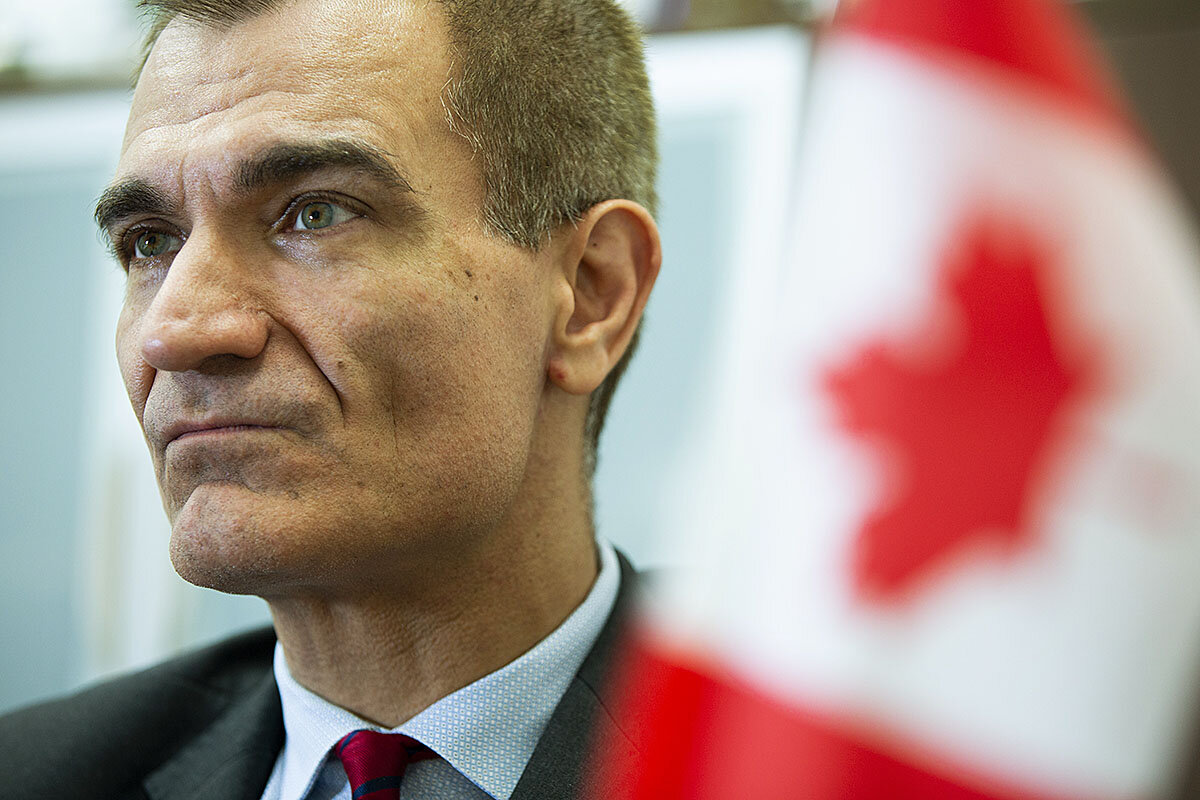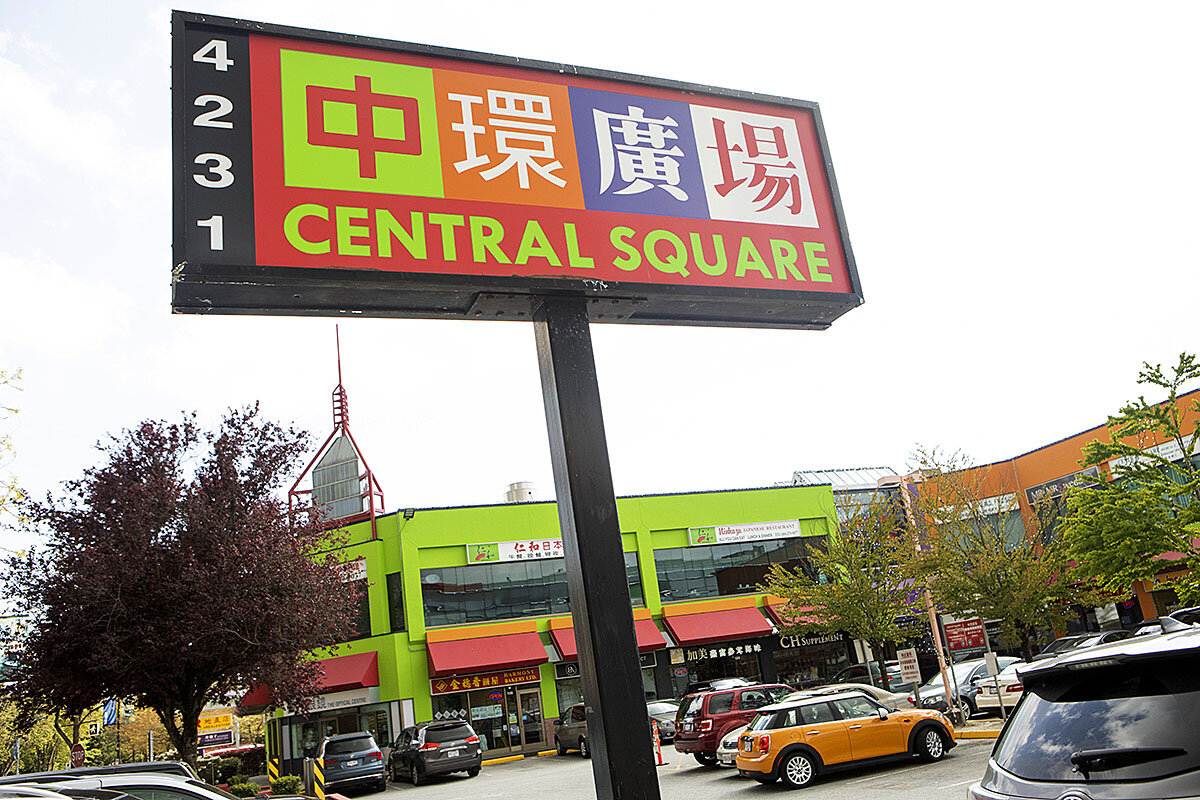When does birthright citizenship become citizenship for sale?
Loading...
| Richmond, British Columbia
Kerry Starchuk’s activism begins with homemade granola cookies – specifically, when she took a plate to her new neighbors.
Except the man and a toddler boy who she heard bouncing a basketball outside, and the two pregnant women with them, hadn’t moved into the house next door to hers, where she has lived since 1988. Visitors from China, they were residing in her neighborhood only temporarily and didn’t respond to her greeting. After they awkwardly accepted her cookies, she never saw the group again.
It wasn’t the first time she’d seen pregnant women coming and going in her neighborhood or heard about why they were there. But the meeting began her personal battle against “birth tourism,” where wealthy mothers like the ones she encountered next door pay to give birth, get citizenship for their babies, and return home.
Why We Wrote This
Birthright citizenship is a topic of hot debate in both Canada and the U.S. But whereas in the U.S. it’s often tied to illegal immigration, the issue up north is about whether Canada is effectively “selling” citizenship to wealthy foreigners.
It is an issue gaining prominence across North America, where jus soli, or rules by which citizenship is determined by birthplace, is the standard practice (yet otherwise rare among developed countries, as in Europe where citizenship is more restricted and often granted along bloodlines). An online petition that Ms. Starchuk started against the practice last year, garnering some 11,000 signatures, was supported by a federal Liberal lawmaker representing Richmond. Meanwhile, the federal Conservatives, in opposition during an election year, voted on a motion last summer to tighten laws around birthright citizenship. In the United States, President Donald Trump has said he will end it by executive order.
Mr. Trump’s threat drew widespread criticism by critics who call it anti-immigrant pandering. But concerns about citizenship rules span partisan lines. In Canada, a poll from the Angus Reid Institute in March showed that while more believe birthright citizenship is a good policy than a bad one (40% versus 33%), 60% believed rules needed to be tightened to counter abuse of the system.
Ms. Starchuk, a part-time housecleaner, insists her position is not anti-Chinese or anti-immigrant but is about rules and values, especially in a region where foreign wealth and capital have changed the face of communities. In Richmond, the mothers hail mostly from China, lured by advertisements that sell all-inclusive packages including a stay at a “birth hotel.” Other hospitals in Toronto and Montreal have seen increases in mothers from Eastern Europe or Africa. A recent data analysis showed Richmond’s local hospital with the highest percentage of births to mothers residing outside Canada.
“It does undermine me, because I’m trying to build community and welcome my neighbors to the neighborhood,” she says. “And then I find out it’s not a single-family home where there’s going to be a new family but an international, underground birth-tourism hotel. ... It’s like selling citizenship.”
An abuse of the system?
The issue under debate in Canada, which established citizenship rules under the 1947 Canadian Citizenship Act, is largely about the power of foreign money and how it devalues citizenship. The debate in the U.S., on the other hand, sometimes targets so-called anchor babies but revolves around undocumented migration. It was rekindled last fall with Mr. Trump’s threat, which has been highly polarizing.
The national conversations converge around questions of fairness and the changes people fear and perceive around them.
Martha Jones, who wrote “Birthright Citizens: A History of Race and Rights in Antebellum America,” says that citizenship is always an evolving political question. In the U.S., questions about birthright citizenship arose in the early 19th century around the status of former slaves, which culminated in the 14th Amendment in 1868.
But that didn’t settle the issue, and in some ways the debate today is analogous to the one around former slaves because it leaves an entire class of people in a legal limbo. “It is a tragic example of the ways in which American lawmakers have failed in my view to fulfill their obligation to extend to people some basic sense of who they are,” Ms. Jones says.
In Canada, the Conservatives last summer voted that the party should support the position that a baby born in Canada should receive citizenship only if one parent is a Canadian or permanent resident.
Not all Conservatives agree with their party. Deepak Obhrai, a Tory lawmaker from Calgary, says that birth tourism abuses could be addressed with immigration procedures that target the parents but not the child. “It takes away the fundamental right of the child,” he says. “A Canadian is a Canadian is a Canadian.”
Those fighting birth tourism have been accused of overexaggerating the problem. Federal statistics show only 313 births by nonresident mothers in 2016. But new research using hospital financial data puts the number at 3,223 that year. One of 5 births at Richmond Hospital is to nonresident mothers, those figures show.
Joe Peschisolido, the Liberal lawmaker who sponsored Ms. Starchuk’s petition and is awaiting a government response, says it might not be illegal, but that doesn’t make it right. “It’s an abuse of the system,” he says at his offices in Richmond. “It’s a business where people are making money off of the goodness of Canadians.”
And it’s something that many in the community care about, he says. His next meeting is with a constituent who, on his way in, says he’s here to talk to Mr. Peschisolido about ending “birth tourism.”
Among some of the fiercest critics of birth tourism are Chinese immigrants in Richmond.
“Why would the parents want to get their children Canadian citizenship if they themselves don’t want Canadian citizenship?” says one mother, who didn’t want to share her name. She’s at Parker Place, one of several shopping centers catering to the Chinese community.
She emigrated to Canada in 1990 from Beijing and says she had to work hard to learn English. But today, Richmond is 54% Chinese, compared with 34% in 1996. And now newer Chinese immigrants don’t learn the language as she had to, she says, and Mandarin is increasingly heard in town.
‘It’s the unfairness of it’
It is easy to dismiss Ms. Starchuk, who also ran a campaign against Chinese-only signage in Richmond, in a country that embraces multicultural tolerance. But, as a fourth-generation resident of Richmond that has always been diverse, she says her fight is about inclusion and maintaining a healthy community.
This battle is, in fact, amplified by the backdrop of larger changes taking place around her in Greater Vancouver. Foreign money has pushed up housing prices and displaced locals, including her own grown children, who she says haven’t been able to purchase homes and instead rent in Richmond.
She says she probably wouldn’t have gotten involved in the birth tourism fight if it had not been in her backyard, literally.
“This is not ‘a nothing issue,’” says Ms. Starchuk, who has binders full of letters, petitions, and news clips she’s collected about her efforts.
She says not everyone will agree with her. “Some will say, about birth tourism, that they will do whatever they can to get to Canada, even if I have to cheat. Others will say, ‘I paid for it. Why shouldn’t I be able to get what I want?’”
Ultimately, though, it violates her sense of what it means to be Canadian.
“It’s the unfairness of it,” she says. “Citizenship is not partisan, Liberal or Conservative, but about Canadian values. When you’re an immigrant, you take and you contribute.”
“This,” she says, “is a free-for-all.”








